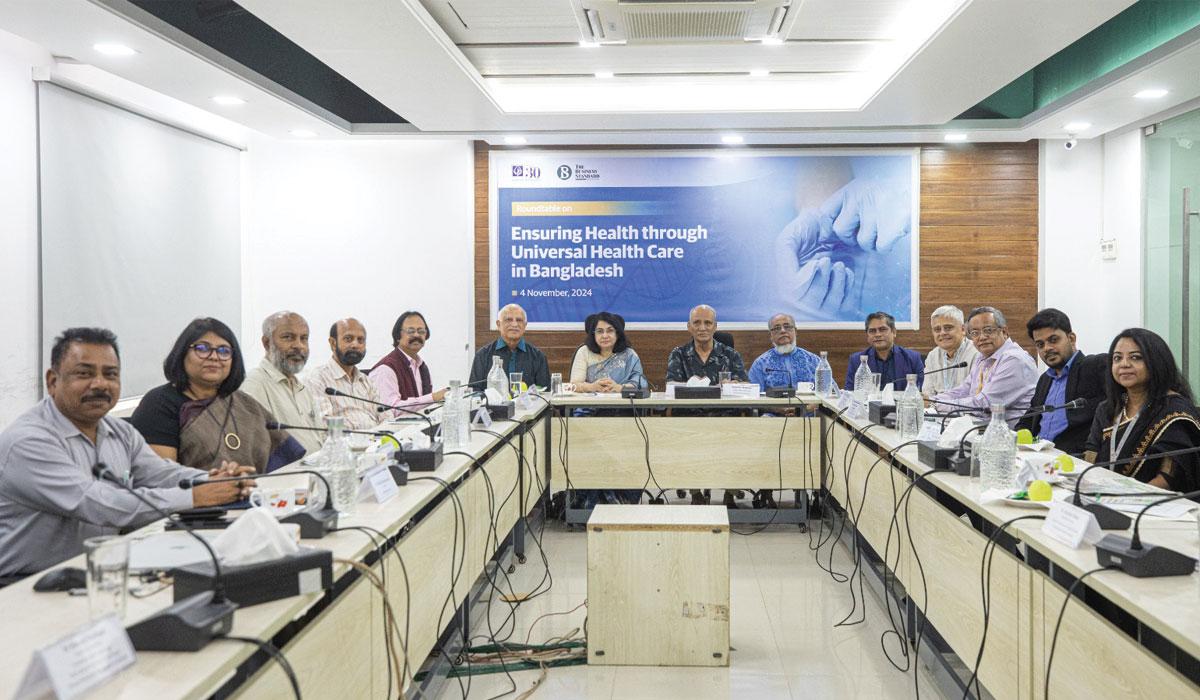
The urgent need for Bangladesh to transition to a universal healthcare system that is equitable, accessible, and financially sustainable has become a pressing priority. Despite notable economic progress, Bangladesh’s healthcare system remains underfunded and overly reliant on out-of-pocket expenses, which push many families into poverty.
Experts at a roundtable titled ‘Ensuring Health through Universal Health Care in Bangladesh’ organised by the Centre for Policy Dialogue (CPD) and The Business Standard on 4 November 2024, emphasised that achieving universal healthcare requires a collaborative approach that combines public and private sector resources, harnesses technology to enhance preventive and primary care, and ensures that healthcare is a right accessible to all citizens, rather than a privilege.
Key recommendations from the roundtable included restructuring primary healthcare, emphasising preventive care, embedding health education within communities, and establishing universal health coverage to protect families from financial distress. The event highlighted that these initiatives, supported by accountability, skilled human resources, and strategic use of technology, are essential to transforming Bangladesh’s healthcare landscape.
In her introductory remarks, Dr Fahmida Khatun, Executive Director, CPD, highlighted ‘Government’s health budget allocation is less than one per cent of GDP and only 5.2 per cent of the overall National Budget. In the fiscal year, this allocation remains stagnant at 0.74 per cent of GDP. Such low spending on healthcare causes an increase in poverty, pushing families further into economic hardship’.
She elaborated that this situation brings an urgent need for universal health coverage. Achieving this would benefit both individuals and the nation as a whole. Medium and long-term plans have highlighted healthcare as a priority, yet these targets remain unmet.
Dr Mushtaque Raza Chowdhury, convenor of Bangladesh Health Watch, has called on the interim government to provide free medications to reduce out-of-pocket healthcare expenses. ‘Mass movements can drive positive change’, he noted, adding that over the next year and a half, the interim government has a unique opportunity to make significant improvements in the health sector, such as establishing a Health Security Office, forming a Permanent Health Commission, and implementing the Shasthyo Shurokhsha Karmasuchi (SSK) in every police station, alongside essential policy revisions.
Dr Syed Abdul Hamid, a professor at the Institute of Health Economics at the University of Dhaka, highlighted that the SSK, launched in Tangail in 2015 as a pilot project with an initial package of BDT 50,000, could now be expanded to BDT 100,000. He recommended that this programme should not be limited to those in poverty but extended to all citizens. ‘An investment of BDT 4,000 to BDT 5,000 crore could transform the health sector’, he added, suggesting that this allocation could also support the development of a referral system to streamline patient access from primary to specialised care.
A referral system guides patients from primary care to specialised services, enabling better access to higher levels of care when necessary. Dr AM Zakir Hussain, chairman of the Community Clinic Health Support Trust, attributed the poor quality of healthcare services to factors such as limited resources, outdated technology, low motivation among healthcare workers, insufficient prioritisation, a fragmented system, and inadequate pricing assessment and procurement processes. He emphasised that successful Universal Health Coverage (UHC) relies on efficient healthcare delivery, robust health system management, sufficient resources, and fair distribution, which can be achieved through a well-structured input-process-output model, access to essential technologies, and equitable service provision.
Dr Lelin Choudhury, chairman of Health and Hope Hospital, underscored the need to include individuals below the poverty line, approximately 18 per cent of the population, in government health services. ‘Issuing health cards for these individuals could ensure they don’t miss necessary care’, he suggested. Dr Choudhury further emphasised the importance of setting a uniform standard across public and private hospitals to foster a mindset of equitable and accessible healthcare.
Dr Dibalok Singha, executive director of Dushtha Shasthya Kendra (DSK), called for a strong government commitment to health sector improvement. He suggested that Bangladesh could draw on successful UHC models in countries like Rwanda, Vietnam, Brazil, and Thailand, adapting those lessons to local needs. ‘With approximately 400 million people in extreme poverty, our allocation of only 0.74 per cent of GDP for health should be raised by at least 1 per cent’, he stated, stressing the importance of strategic prioritisation for short, medium, and long-term development of the health sector.
Dr Mahbub Elahi Khan Chowdhury, a scientist in icddr,b’s Health Systems and Population Studies Division, asserted that out-of-pocket expenses would decrease if services were made more accessible at government health centres.
Dr Khondaker A. Mamun, founder of CMED Health Ltd, highlighted that Bangladeshis spend around $10 billion annually on healthcare, with $5 billion going to neighbouring countries. ‘Improving domestic healthcare quality would not only retain this expenditure within Bangladesh but would also alleviate the financial burden on families’.
The roundtable was also attended by prominent health sector professionals, including Professor Liakat Ali, former vice chancellor of Bangladesh University of Health Sciences; Dr Sohana Shafique, assistant scientist at icddr,b; Dr Nahitun Naher, assistant director at the Centre of Excellence for Health Systems and UHC; Dr Mohib Ullah Khondoker, director at Gonoshasthaya Kendra; Dr Md Aminul Hasan, former DGHS consultant; Professor Rashed E. Mahbub, former president of Bangladesh Medical Association (BMA); Dr Subrata Paul, UHC focal point at the Health Economics Unit; and Dr Md Monzur Hossain, programme manager at the Ministry of Health and Family Welfare.
Press Report: The Business Standard



